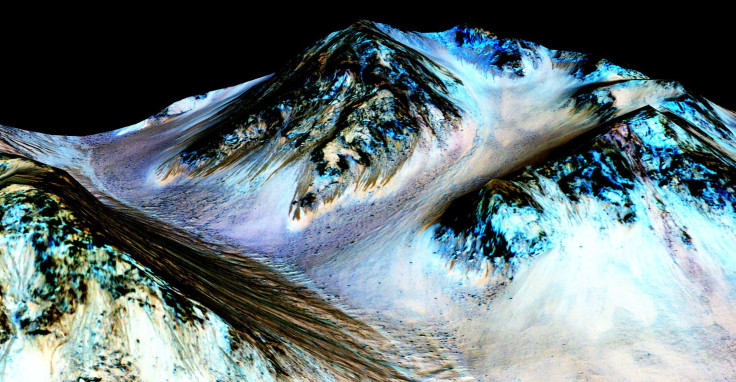Salty water exists on Mars, opens hope for life refuge, confirms NASA

Researchers can now move forward in solving the mystery of the presence of flowing liquid water on the surface of Mars. NASA revealed on Monday that it has discovered potentially life-giving salty water flowing on Mars, giving hopes to the presence of life on its surface.
NASA experts said the latest discovery of liquid water on the dry landscape of the Red Planet raises the possibility that some microbes might also exist on the planet’s surface. Salt has been found to help water on Mars stay in a fluid state by altering the freezing and vaporisation points of water.
However, Alfred McEwen, head of NASA's HiRISE high-resolution camera aboard the Mars orbiter, noted during NASA’s press conference that the fluid found on Mars is on “thin layers of wet soil, not standing water." But the salty briny water, experts say, could still offer the possibility that there's life on Mars.
NASA discovered the watery flows on the planet by looking at light waves returned from seasonal dark streaks on its surface, which was provided by an imager aboard the Mars Reconnaissance Orbiter. The dark streaks have been long suspected to be linked with liquid water.
Lujendra Ojha, a doctoral student at the Georgia Institute of Technology who first discovered the streaks in 2011, said that light is being absorbed by the streaks at specific wavelengths, which is linked with chemicals to pull water from the atmosphere of Mars in a process known as deliquescence.
The new study, published in the journal Nature Geoscience, shows the chemicals help the Martian water remain in liquid state during very low temperatures. The chemicals also prevent it from boiling, even though the low atmospheric pressure in Mars will lead any liquid water to rapidly boil.
However, NASA still hasn't determined the exact source of the water. Theories indicate the water might come from a great depth in the form of ice.
Prior to the discovery, it was already found that ancient Mars had water frozen at its poles. NASA considers water in the liquid state a “key requirement for life on Earth,” and believes that its presence on Mars “points to environment[s] that are more habitable than previously thought," Ojha told Space.com.
In addition, McEwen said that life-like microbes might soon be found in the crust of Mars. The findings will also allow space agencies to look for better landing sites to search for life, according to Jim Green, director of planetary science at NASA.
Dr Joe Michalski, a Mars researcher at the Natural History Museum in London, said the presence of water on Mars has been an “exciting” discovery. Michalski explains that on Earth, wherever there is water, people will find life.
However, Ojha clarifies that the findings don't directly imply the existence of life on Mars today. The surface of the planet has a very low "water activity," indicating that the salty water flowing in it is not easily available for potential use by organisms.
Contact the writer at feedback@ibtimes.com.au or tell us what you think below




















